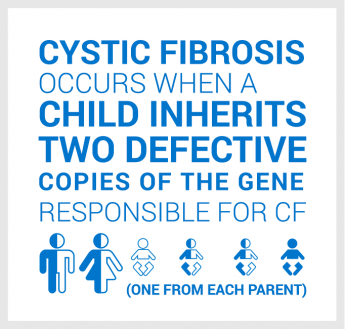Get ready to bid and raise crucial funds for Cystic Fibrosis Canada!
Read MoreFrequently Asked Questions & Answers
Two health measures are provided for each accredited CF clinic across Canada along with the national average. The data are from January 1 to December 31 for the year. The measures are 1) Lung function (measured by FEV1% predicted) and 2) Nutritional status (measured by body mass index (BMI)).
Feel free to discuss the data with your healthcare providers at your CF clinic. This is an opportunity to review the data with your doctors and CF team, and discuss how you can work together to improve your own personal measurements as well as the outcomes at the clinic as a whole. This is a collaborative effort and we encourage on-going discussion and communication between yourself and your CF team.
The data come from the CF registry which collects information on over 4,000 people with cystic fibrosis who are actively receiving care at accredited clinics. Each CF clinic obtains individual patient consent to have data submitted to the registry. Annual data are collected on measurements such as height, lung function, weight, pancreatic enzyme use, CF complications and treatments. Additional general information is collected about each individual such as gender, race and genotype. These data are aggregated to produce summary statistics so we can better understand the health of Canadians with cystic fibrosis.
Ask your clinic how you can help to contribute to improving the clinic’s outcomes. Also, learn about the quality improvement initiative led by Cystic Fibrosis Canada. You can also make a big difference by reviewing your own or your child’s health outcome measures and making yearly visits to your CF clinic.
Cystic Fibrosis Canada does not rank CF clinics because it can vary greatly depending on which measurement is chosen for the ranking. All CF clinics are accredited and visited every few years by representatives from Cystic Fibrosis Canada to conduct evaluations and ensure best practices are implemented and staffing resources are adequate.
The data summarize the average health measurements for the year of all participating CF patients nationally and within each CF clinic.
Adjusting data allows CF Canada to properly compare data between clinics. The lung and nutritional data are adjusted for patient age, sex, age at diagnosis, and pancreatic enzyme status. Without adjusting the data, you would be making unfair comparisons between clinics. For example, we know that lung function worsens as individuals get older. If clinic A has, on average, younger patients than clinic B, and clinic A has a higher average lung function value, this may simply be due to the fact that the patients are younger at clinic A. It would be unfair to say that clinic A is “better” than clinic B if the reason for the higher lung function is simply the younger age of the patient population. By adjusting for factors such as age, we can take into account factors that would have an impact on specific outcomes.
Cystic Fibrosis Canada makes clinic-specific data available on the website such as lung function and nutritional measures which are known to be associated with survival. We are confident in the accuracy and quality of these data. In the future, additional factors may be available but we need to ensure the quality of the data before making them publicly available.
There are many other factors that you should also consider when choosing a CF clinic. These include the resources and staff at the clinic along with the social and financial assistance available within each province. These data only highlight a small part of the overall health care provided by each CF clinic. Cystic Fibrosis Canada does not recommend choosing a clinic based on clinic-specific outcomes of two variables. But rather these data may stimulate discussion and action about how these outcomes and the health of individuals with cystic fibrosis can be improved at all CF centres across Canada.




